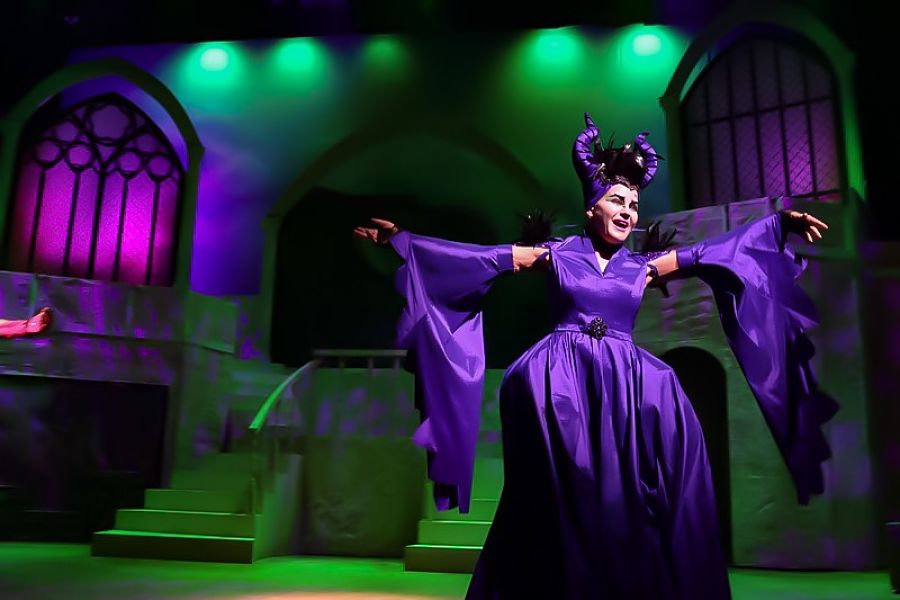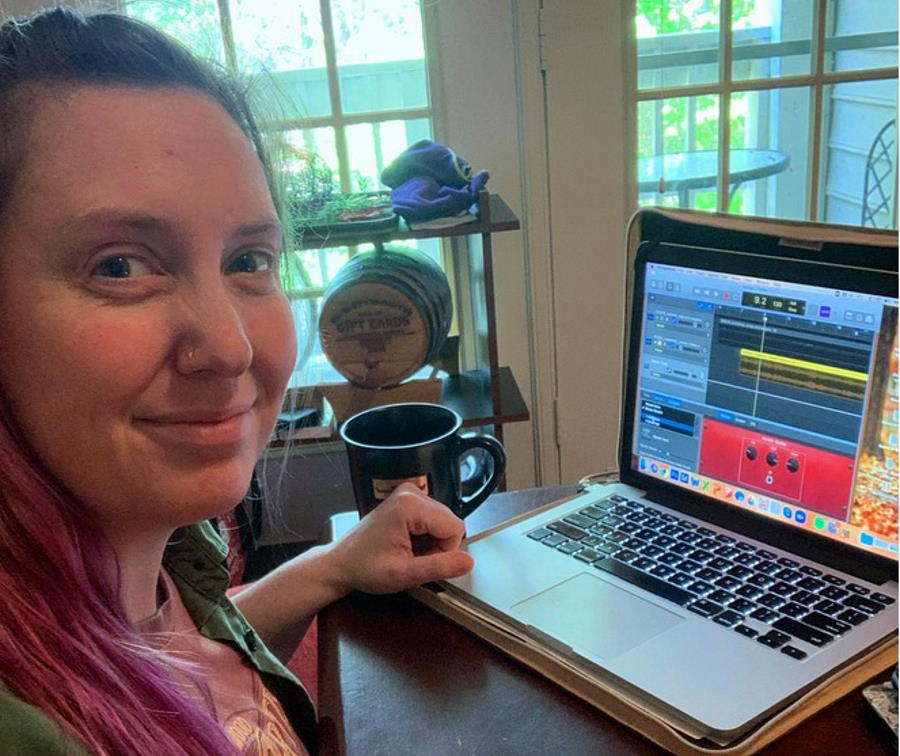This is part of a season preview package.
For Bridgette Dennett (she/her), the return to in-person theatre practice can’t come soon enough.
“It’s very depressing teaching a technical theatre class without students being able to do technical theatre,” Dennett told me in a recent Zoom interview. A scenic designer and assistant professor in the department of Theatre and Dance at the University of Mary Washington in Fredericksburg, Va., Dennett described some of her teaching over the past year as “how to use power tools but saying, ‘These are theoretical, you shall never touch them.” With school now in session—with masks, reduced class sizes, and some social distancing to prevent COVID-19 spread—she said with relief, “I was joking with my technical production class yesterday, I was like: ‘I just want to tell you guys I’m so happy to have you here. We’re actually going to do lab hours this semester!’”
Also marking a hands-on return for Dennett: the current production of Disney’s Descendants at the Omaha Theater Company’s Rose Theater in Nebraska (running through Oct. 10), where she’s been designing sets since she was in graduate school at Indiana University. Indeed, she counts herself fortunate that the pandemic shutdown only meant postponement, not outright cancellation, for two gigs she booked at the Rose: Descendants, which had initially been slated for May but opened Sept. 10, and The Sound of Music, moved from the 2020-21 season to May 2022.
For Descendants, Nick Blaemire and Madeline Smith’s stage version of the popular animated musical film about the children of various Disney villains, Dennett said her approach was less reliant on well-known IP than on an approach akin to working on “Shakespeare or a normal play; we talked about, what is this world that they live in?” Director Katherine M. Carter noted that the musical’s fictional boarding school is on Italy’s Amalfi Coast, “so we used a lot of that color palette, the plaster architecture.” And while the production picks up on the blue-and-gold colors of the Auradon Prep School, founded by the titular couple of Beauty and the Beast, the designers were not only free to design their own logos—they used a school crest created by middle school and high school design students at the Rose Theatre. As for Sound of Music, Dennett described her set as “within nature—very, very green.”
Her approach to designing well known properties, she said, is to try to look past iconic designs to the creators’ original inspiration. She used Bob Fosse’s distinctive choreography as an analogy: “You don’t go, ‘Okay, we’re doing this show with Fosse-style choreography, so let’s do Fosse’s choreoraphy.’ You go: Well, what was Fosse responding to? Where does that visual language come from? If you go back to the original sources, you can find something new that’s your own but still feels like the play or feels like the world.”

It’s a lesson she’s imparting to her students via their upcoming production of The Curious Incident of the Dog in the Night-Time. “Bunny Christie’s original set is all over the internet,” Dennett noted, “so I feel like when most people think of it, they see a very beautiful LED set or some kind of a technological grid.” She’s encouraging her students to “find ways to step into our own territory intentionally, and stay away from the other designs. It’s a very technologically fun show to play with lights and projections and flashing things, but how can you do it in a way that doesn’t look like what everybody else has done?”
The pandemic lockout did have a few upsides for her: She was able to spend time doing advocacy with the Guild of Scenic Artists, of which she remains a member. And remote teaching forces her to start making how-to videos for her students on particular tasks, from building maquettes to drafting in AutoCAD, a software platform for scenic design. “I’d never thought of myself as a content creator,” she marveled. “And this past year I was.” For some tasks, she even found that asynchronous teaching even has distinct advantages. “In design classes, particularly if you demo techniques for model making, students would forget it when they walk out the door. But now they all of a sudden have videos they can pause, rewind, and access as they’re working. It makes it so that that instruction isn’t just in the moment, but archived. They can retrieve it later if they need to, which has been wonderful for certain types of learning for certain people.”
Though she counts herself fortunate to have had a teaching job and flexible employers at the Rose to sustain her through the pandemic, she’s hopeful that the move she and her husband made in the fall 2019, from the Midwest to the D.C./Maryland/Virginia area, will also lead to design work in that region’s theatre scene. As the field returns, however haltingly, to in-person theatre, she has more than her own particular future in mind.
“My number one fear is—I’m hoping that the conversation about making theatre accessible for people of underserved communities isn’t lost,” she said. “There has been so much criticism of people in theatre who are financially secure enough to do unpaid internships. I feel like that conversation and that shift is happening at a time where that gap could widen even further. Because who else has been able to survive having a year off?”
One related byproduct of the tough year-and-a-half just past, she said, is that a process that typically happens after students graduate is starting earlier. The pandemic, she said, is “separating the people who want to do this and have that resilient inner steel from the people were like, ‘Theatre would be fun.’ You’re seeing that some kids are hungrier than other kids. Normally that comes out once they leave and go into the workforce, but it’s coming out earlier.”
That’s a hard lesson to absorb so young, but it mirrors theatre’s own rocky trajectory over the millennia. “Theatre is a resilient art form, right?” Dennett said. “Like, if you look at theatre history, how many times has there been a shutdown or a plague or things have burned down? It always comes back.”
Rob Weinert-Kendt (he/him) is the editor-in-chief of American Theatre. rwkendt@tcg.org
Creative credits for production photo: Disney’s Descendants, book by Nick Blaemire, music adaptation by Madeline Smith, vocal and incidental arrangements by Madeline Smith, additional lyrics by Nick Blaemire, orchestrations by Matthew Tishler, music produced by Matthew Tishler, based on the Disney Channel original movies written by Josann McGibbon and Sara Parriott, directed by Katherine M. Carter, music diredted by Jerry Brabec, choreography by Sue Gillespie Booton, scenic design by Bridgette Dennett, lighting designer by Matt Benes, sound design and engineering by Christy Hernandez, costume design by Sherri Geerdes, hair and makeup design by Zach Kloppenborg


